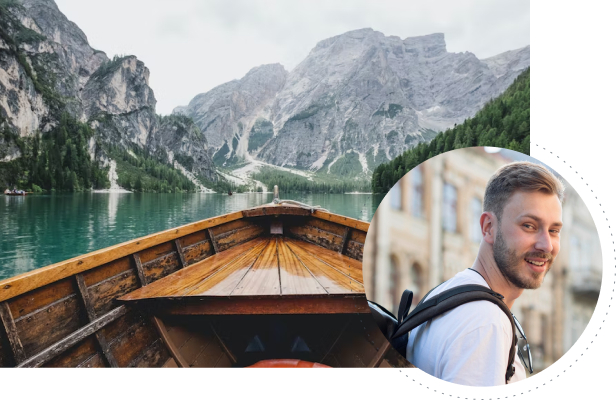Suggested Length of Stay
If you want a good overview of Rwanda, experiencing the cultural and natural wonders of the country a good length of stay is between 7-12 days.
Recommended length of stay in the more popular destinations are Kigali 2 Days, Lake Kivu 2-3 Days, Volcanoes National Park 3 days and Akagera National Park 2 days.
Modes of transport
Road
Rwanda has a well-surfaced road network linking the major towns, and the most convenient way to travel the country is by car. Smaller roads are frequently unsurfaced with varying conditions, especially during rainy season.
Tour operators can arrange a vehicle with driver, or several agencies rent out cars and 4x4s. Taxis operate in the larger towns. Travel insurance may not cover motorbike taxis, which are also common.
There are no rail services and the most popular form of public transport is shared minibuses. In Kigali, buses operate a smart card system called Tap&Go.
Air
Domestic air travel within Rwanda is very limited with only a few cities having commercial flights daily.
Health Precautions
The greatest health risks in Rwanda are accidents and malaria. Much of Rwanda lies at too high an elevation for malaria to be a major concern, but the disease is present and prophylactic drugs are recommended. Travellers should seek professional medical advice on taking anti-malarial medicines and take precautions to avoid mosquito bites, especially between dawn and dusk.
Travellers should ensure they are up to date with vaccinations, following the advice of their local healthcare provider, and should consider bringing a small first aid kit. A certificate of yellow fever vaccination is required.
It is advisable not to drink tap water. Bottled mineral water can be bought in all towns – make sure the seal is intact.
As a small country, medical help is rarely far away. For basic treatment, most towns of any size have pharmacies with a limited range of medicines, while larger towns have hospitals. King Faisal Hospital in Kigali is the most advanced in Rwanda.
Food
Rwandan food is neither spicy nor hot. People eat simple meals made with locally grown ingredients. The Rwandan diet consists mainly of sweet potatoes, beans, corn, peas, millet, plantains, cassava, and fruit. The potato is now very popular, thought to have been introduced by German colonists.
Rwandans who live in rural areas rarely eat meat. Some families have cattle, but since cattle are considered a status symbol, people seldom slaughter them for meat.
In urban areas meat is more plentiful. The most popular meats are beef and chicken. People who live near lakes may catch and eat fish. Tilapia and sambaza are raised on fish farms and are popular choices.
A traditional breakfast consists of sweet potatoes and porridge. Lunch and dinner may consist of boiled beans, bananas, sweet potatoes or cassava. Umutsima (a dish of cassava and corn), isombe (cassava leaves with Eggplant and spinach) and mizuzu (fried plantains) are common dishes. Dinner is the heaviest meal.
Between meals, Rwandans often snack on fruits. Tropical fruits such as avocados, bananas, mangos, pineapple, and papaya are abundant in Rwanda. Roadside vendors in urban areas sell roasted corn and barbecued meat.
Money
Although US dollars are widely accepted, the Rwandan franc (Rfr) is the principal currency.
Expect to pay for local services in cash, in Rwandan francs. The greater the amount, the more likely US dollars or other hard currencies are preferred, such as gorilla tracking and upmarket hotels.
A growing number of places accept credit and debit cards, with Visa being more widely accepted than Mastercard. It’s best to check when making a booking.
ATMs can be found in Kigali and nearly all major cities.
Cash can be exchanged at banks and private forex bureaux (bureau de change). Both are closed on Sundays and public holidays.
It may be impossible to exchange traveller’s cheques away from the capital. Western Union facilities are common.
Time Zone
Rwanda operates on Central Africa Time(GMT/UTC + 2 hours) and 8.5 hours behind AEST.
Visas
As of 1st January 2018, nationals of all countries receive visas upon arrival at Kigali International Airport and all land borders.
Australia doesn’t have an Embassy or Consulate in Rwanda. The Australian High Commission in Kenya provides consular assistance to Australians in Rwanda.
Australian High Commission, Nairobi
Riverside Drive (400 metres off Chiromo Road)
Nairobi, KENYA
Telephone: +254 20 4277 100
Fax: +254 20 4277 139
Website: www.kenya.highcommission.gov.au
Rwanda Embassy contacts in Australia (located in Singapore)
High Commission of Rwanda
8 Temasek Boulevard
#14-03 Suntec Tower 3
Singapore 038988
Tel: +65 6884 4621
Fax: +65 6884 4206
Email: info@rwandaembassy.org.sg
Electricity
In Rwanda, the power sockets are of type C and J. The standard voltage is 230 V and the standard frequency is 50 Hz.
Getting there (stopovers)
Currently, there are no direct flights between Australian cities and Kigali. However, the best way would be either via Dubai or via South Africa.
Tipping Guideline
Tipping is discretionary and appreciated. Cash is usually preferred. As a rough guide, tip professional guides and drivers US $10 per day, trekking porters USD $2.

Ready to discuss your trip to Rwanda?
Speak to one of our travel specialists and we’ll create your personalised itinerary just for you.
